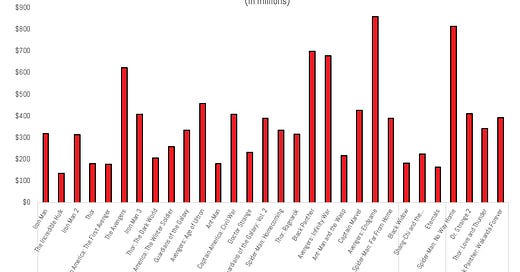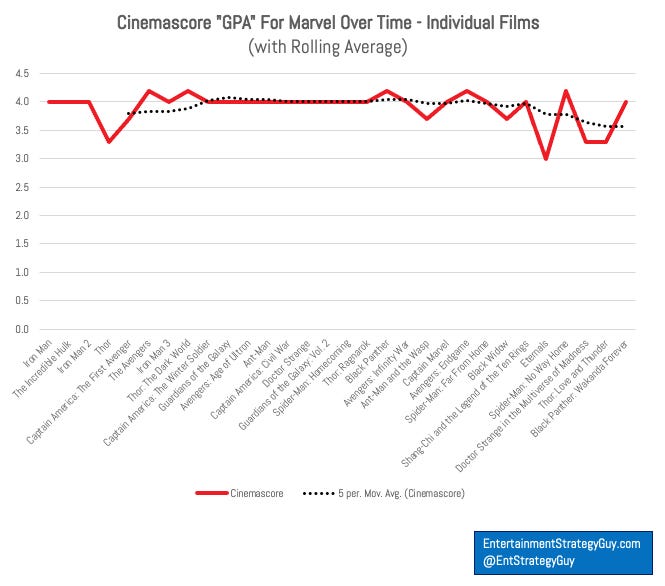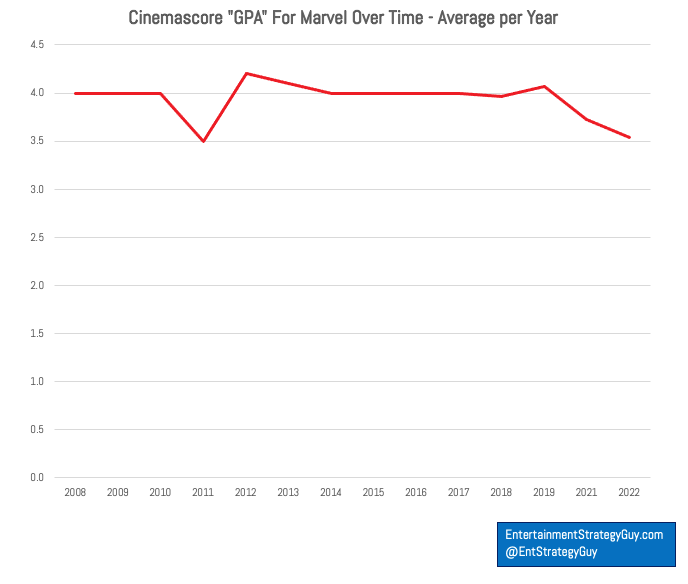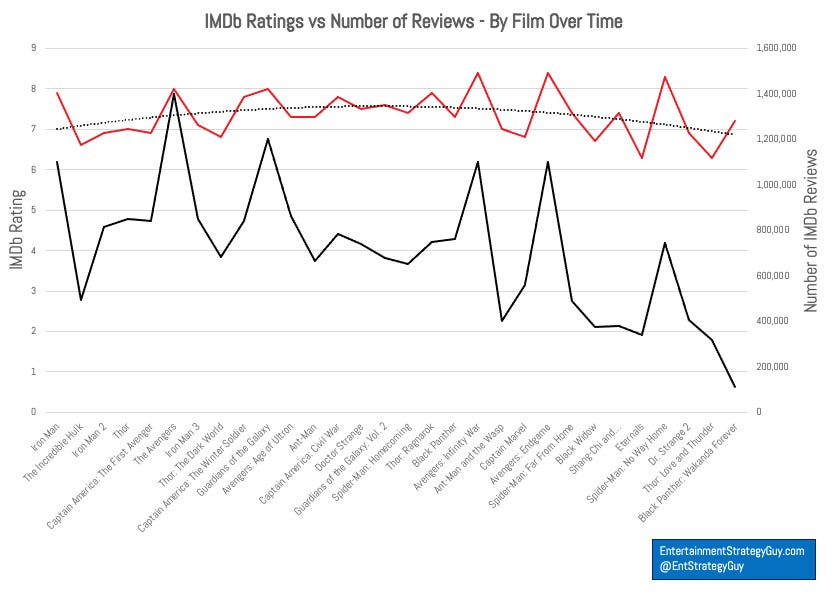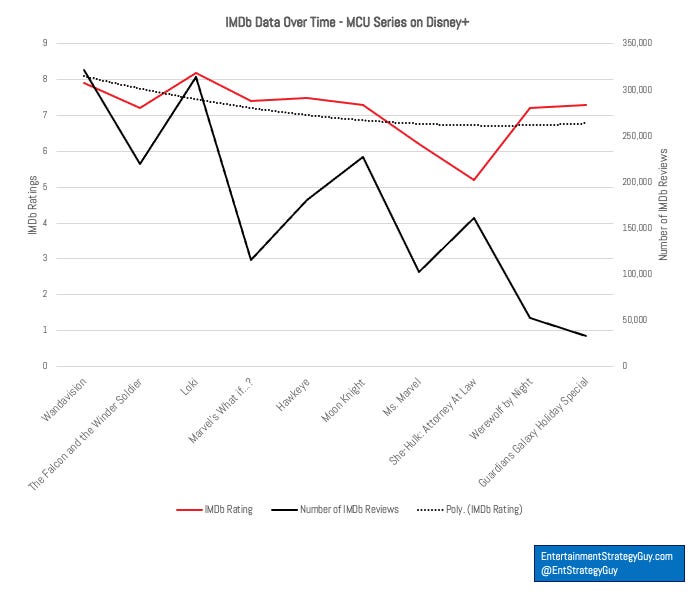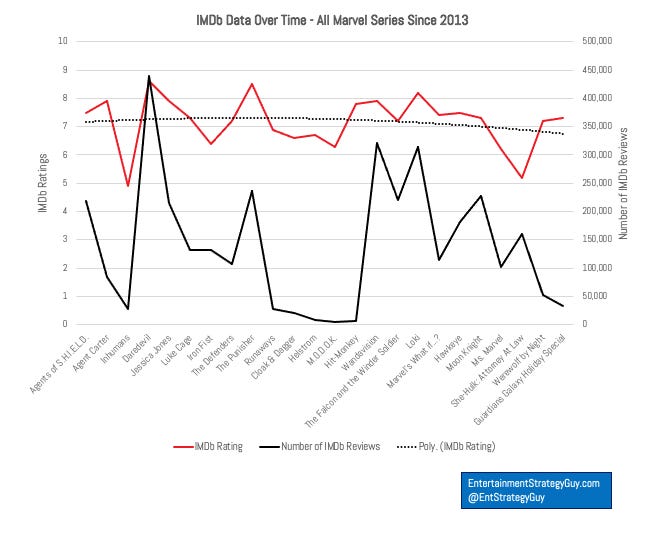Are We in a “Marvel-cession”?
What the Data Says About Marvel’s Very Bad, No Good (But Actually Just Uneven) Year
If I had to pick one word to describe the MCU in 2022, it would be this:
Uneven.
Even though I’m a huge, die hard MCU fan, my most common reaction after watching an MCU TV show or movie has been, “Oh, that was pretty uneven.”
And that pretty accurately describes Marvel Studio’s year from a business perspective as well.
Whenever Marvel hiccups, the handwringing comes out in force. Last summer, after Doctor Strange in the Multiverse of Madness and Thor: Love & Thunder (I’ll be using shorter titles from here on out) disappointed critics and analysts, and after the Ms. Marvel TV show flopped, new outlets published think pieces (some of them were pretty good!) about what’s going wrong at Marvel. Personally, I wanted to wait to see how Wakanda Forever and She-Hulk: Attorney at Law fared before I made my call.
Now, it’s time to step back and look at the MCU. Is it doing well? Or poorly? Or, somehow, both? What do the numbers actually say? That’s the plan for today; looking at the data. Tomorrow, in a bit of twist, I’m going to diagnose the MCU’s problems and how I would fix them, playing a combination of creative exec/arm chair film critic/franchise manager, something I don’t normally do (but as I did for Star Wars a few years back). As a big genre fan/nerd, well, I’m giving myself a pass again.
But let’s start with the data.
On the Film Side, It’s (Mostly) All Good
Perhaps the weirdest thing to me about this summer’s reactions to Thor 4 and Dr. Strange 2’s box office performance is that...both films did fine? If not great? After all, Marvel Studios will have four of the top seven or eight films (depending on how well Avatar 2 does) in 2022, and one of those films is Spider-man: No Way Home…which came out in December!
All that said, if you squint, you can see a bit of a decline, recently, for the MCU. The trouble is disentangling this from the general problems facing theaters, which have a direct impact on box office performance.
Let’s start there, using three time frames: before, during and after Covid-19. Here are the domestic theatrical grosses:
I mean, if you forced me to do this analysis a year ago, looking at Eternal’s Covid-19 impacted box office, then yeah the MCU had a problem. But honestly, if you look at the post Covid-19 “era”, for lack of a better term, the MCU is fine? If anything, it’s crazy how consistent the last three titles have been, each getting at least $340 million in domestic box office. Dr. Strange 2 and Thor 4, for example, did better than their predecessors at the box office.
International grosses are a bit trickier because of, in one word, China. They have basically boxed out the MCU, with none of the last four films getting a release in China. Remember, Avengers: Endgame grossed $600 million in China. So losing that revenue hurts things. It will be a long time, if ever, before international grosses catch up to those of 2018 and 2019. But short of that…yeah the MCU looks fine:
So the 2022 MCU films performed well at the box office, but did audiences like them? Fair question. We have two data sources for that. First, here are the cinema scores with a rolling “five film average”:
Here’s another look showing slightly the same thing, the average Cinemascore grade by year:
If you’re on team “MCU slump”, you’ll focus on these Cinemascore grades. No matter how you cut it, the last few MCU films have seen a slump in audience ratings. Black Panther 2 is the only film to get an “A” since Spider-Man: No Way Home (which got an A+), and Eternal’s B still drags that year’s average down.
IMDb data tells a somewhat similar story to the Cinemascore, with a little more noise:
In this case, I added an exponential trend line to show how the MCU started slow, sort of peaked in the mid-2010s, then has had a bit of a downward trend recently. I included the “total number of reviews” as well, but don’t take as much stock in those numbers trending down. Films that have been out longer naturally have more opportunity to gather votes.
Lastly, we should look at subsequent windows, which nowadays means streaming. These Marvel films don’t just come out in theaters, they debut on Disney+, in some cases in as few as 45 days after theatrical. (Something that may hurt theatrical performance.) Notably, all the theatrical films tend to do really, really, really well on Disney+, regardless of box office:
Do I need to bring up the “straight-to-streaming” issue now? If you’re Disney and your Marvel franchises—and future Star Wars films and live action reboots and Pixar movies and more—depend on theaters, then you probably need to do more to support theaters i.e. sending more medium budget films to theater, not straight to Disney+. I mean, you’re not making money on streaming anyways and it’s not really a growth engine, so support theaters!
Speaking of theaters, I can imagine you, the reader, saying, “Hey, EntStrategyGuy didn’t you promise a big, big analysis finally proving that theatrical doesn’t decay streaming ratings? For 2022? Cause it’s nearly the end of December and…I never saw that analysis.”
Well, thanks for asking. Yes I did. It’s on the radar for early on in January of 2023 to start things off with a bang. But in a nutshell, look at those streaming ratings. Outside of Black Widow, basically box office had no impact on streaming ratings. They all did about the same 40 million hours of viewing! May as well get that theatrical money...
On the TV Side, the MCU Has Had a Bad Year
In case you aren’t a super nerd on Marvel series, here’s the quick history of MCU TV in the 2020s:
First, a bunch of series were planned for 2020, when Disney+ debuted, but Covid-19 stopped production on a bunch of them. As such Disney+ released four series in 2021 (WandaVision, The Falcon and the Winter Soldier, Loki, and Hawkeye) then kept up a similar pace in 2022 (Moon Knight, Ms. Marvel and She-Hulk).
Unfortunately, the MCU’s 2022 TV series have underperformed from the 2021 crop of shows. Here’s the data, comparing 2021’s Disney+ MCU shows to 2022:
What’s the best phrase for describing this data? “It’s complicated.” 2021 featured shows with higher heights (WandaVision and Loki), but some other shows with similar viewership to 2022. (Hawkeye and She-Hulk, for example, are basically a push.)
Of course, length complicates this. The Falcon and Winter Soldier only had six episodes, but long episodes averaging 52 minutes per episode. Ms. Marvel had the same run time and number of episodes. Meanwhile, Hawkeye was only six episodes long, but averaged 44 mins per episode. WandaVision had eight half-hour episodes. She-Hulk had eight half-hour (or so) episodes too. See, it’s complicated, but overall, the 2021 shows outperformed the 2022 shows. To simplify things, here's the total charts:
At risk of spoiling tomorrow’s post, the immediate thing that sticks out to me is that this year’s characters were far less popular than 2021’s characters, but also...was the quality at the same level? Here's the IMDb data:
But here’s the thing: this shouldn’t be a surprise. We could actually extend our little history of Marvel TV series back to the start of the 2010s when the MCU films began taking over the box office. Since 2013, the Marvel Studios has released 22 TV shows, first with three on ABC, then six TV shows on Netflix, and later two animated titles on Hulu, and two young adult TV shows on Freeform/Hulu. Aside from Daredevil and Agents of S.H.I.E.L.D., there’ve been precious few genuine hits. And there’ve been a lot of huge bombs, including big swings like The Inhumans or Iron Fist, and minor flops, like all of their YA shows (Runaways, Cloak & Dagger).
It’s like the absolute inverse of DC, which has cranked out semi-popular DC TV shows for a while now, but their films are terrible.
Tomorrow, I’ll offer my advice for how I’d fix all of this, but on the TV side, it won’t be easy. Maybe the MCU/Marvel characters just don’t translate to the small screen.
The Future for the MCU is Still Bright
At the end of the day, I’m actually pretty optimistic about the MCU and Marvel Studios. Remember, Marvel's "slump" is the envy of any other movie studio.
On the film side, I think they’re going to keep cranking out hits. Maybe some of next year’s films won’t do great— the Ant-Man films haven’t had huge box office success—but the third Guardians of the Galaxy film will be huge. In 2024, they’ve got big films, with a new Captain America movie, a star-studded Thunderbolts film anchored by characters who have been in lots of MCU films before, Blade (a character whose two hit films started the modern comic book movie era and stars Mahershala Ali), and Deadpool 3 (which has already had two hit films and now co-stars starring Wolverine!)
Medium term, I wouldn’t bet against the MCU. The future looks bright, especially with more Avengers films on their way, plus the X-Men and Fantastic Four are coming to the MCU in the next decade. (If the industry doesn’t destroy theaters in the mean time.) However, those Cinemascore grades for recent MCU films are far from elite, indicating trouble on the horizon. Marvel needs to fix those.
On the TV side, I’m much more pessimistic. Aside from Loki and, possibly, Agatha: Coven of Chaos, their problems will continue. I’m very, very skeptical about Secret Invasion, Echo and Ironheart, since they feature characters that aren’t that popular and aren’t anchored by big stars. I could be wrong, but that’s what the data says to me right now.
So what’s gone wrong and how does Marvel Studios turn things around? Stay tuned tomorrow.

